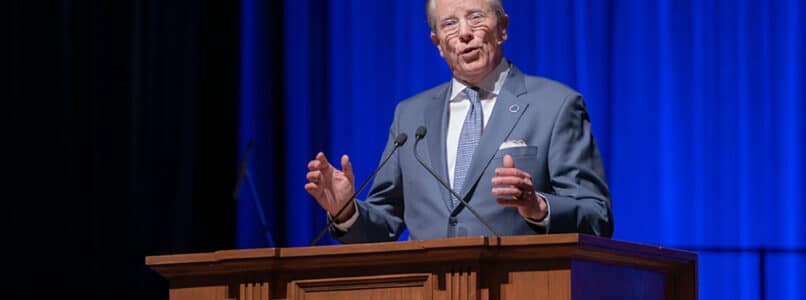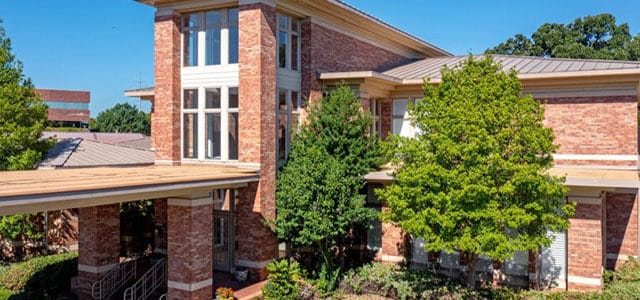Though now gone for more than 107 years, the founder of Southwestern Baptist Theological Seminary, B.H. Carroll, “still speaks” today to the issues that face Southern Baptists, O.S. Hawkins said in an address delivered March 10 as part of Founder’s Day, marking the 114th anniversary of the seminary.
“As Southwesterners, we have a rich heritage, but to find the real strength of this institution we must journey back to the roots, back to the life and legacy of our founder on this Founder’s Day,” said Hawkins, president emeritus of GuideStone Financial Resources and former pastor of First Baptist Church of Dallas, Texas. Carroll’s courage, conviction, consistency, and cooperation are applicable to modern-day Baptist debates on the Bible, confessions of faith, women in ministry, and denominational cooperation, Hawkins contended.
In his introduction of Hawkins, Adam W. Greenway, president of Southwestern Seminary and Texas Baptist College, said he is thankful for Hawkins’ “legacy of leadership” noting “there is nobody more fitting to deliver the 2022 Founder’s Day address here at Southwestern Seminary in the historic Truett pulpit in the historic Truett Auditorium than a successor to Truett in Dr. O.S. Hawkins.” The auditorium is named in honor of George W. Truett, who served as pastor of First Baptist Dallas, 1897-1944, and was a longtime trustee and board chair of the seminary.
Greenway also announced the release of The L.R. Scarborough Treasury, the third volume in the seminary’s Seminary Hill Press’ Legacy Series. The book is a collection of books and other previously published and unpublished works by Scarborough, the seminary’s second president and B.H. Carroll’s chosen successor. Scarborough was one of the first seminary faculty members and the original occupant of the Chair of Evangelism (“Chair of Fire”) established by Carroll – the first chair of evangelism in theological education, which is now named in his honor.
The gathering was the first seminary chapel service in more than a decade to be held in Truett Auditorium in the B.H. Carroll Memorial Building. Founder’s Day is a special chapel service held annually on the date closest to the anniversary of the seminary’s chartering, March 14, 1908.
Greenway, who welcomed officers of the seminary’s board and members of the President’s Club, also announced that the pulpit being used for the first time in Truett Auditorium is believed to be the same one from which Truett preached his first official sermon in 1890 at the First Baptist Church of Sherman, Texas. The pulpit was recently donated by the church to Southwestern Seminary and will normally be on display at the B.H. Carroll Center for Baptist Heritage and Mission.
Hawkins thanked Greenway for “the honor of standing in this sacred desk” and for the “privilege of delivering this Founder’s Day address.” He added, “It has never been more important not only to understand our founder’s vision but to continue to respect and implement it in preparing another generation for Gospel ministry.”
“B.H. Carroll was, hands down, the most influential Southern Baptist leader of his time,” Hawkins said. “Like all our presidents who would come after him, he possessed a pastor’s heart,” noting he pastored the First Baptist Church in Waco, Texas, while developing a course on the English Bible at Baylor University.
Carroll felt a burden while serving as a trustee of Southern Baptist Theological Seminary in Louisville, Kentucky, that “the great and growing Southwest needing their own seminary which would stand as a bulwark against error while being committed to theological orthodoxy, developing the highest standards in research and scholarship while, and at the same time, inspiring students to be actively engaged in evangelism and missions centered in and through the local church,” he said.
Hawkins also noted key dates between 1905 and 1910 when Carroll had the vision for a new seminary, the launching of the seminary, its chartering as a freestanding institution separate from Baylor, and relocation from Waco to Fort Worth.
Behind the scenes, though, Hawkins noted the “tremendous opposition” Carroll experienced by foes and friends. “Had it not been for his personal tenacity and focused faithfulness to the vision he was convinced he had received from God, we would not be seated here today, over one hundred years later on this holy hill,” he said.
Hawkins explained when Carroll sought to move Southwestern Seminary from Waco, Truett, an influential member of the seminary’s board of trustees, was tasked with finding a location to relocate the school. Truett, who did not want the new seminary to relocate away from his alma mater, Baylor, suggested two lots of land in the Oak Cliff neighborhood south of downtown Dallas.
Carroll, Hawkins explained, was angered by the suggestion. J. Frank Norris, then-owner/editor of the Baptist Standard newspaper, “genuinely loved and respected Dr. Carroll” and assisted Carroll with “plenty of space in the Standard” to promote the move of the seminary to Fort Worth.
Most historians, Hawkins added, have failed to credit Norris’ “primary and pivotal role” in the birth of Southwestern, as well as its relocation to Seminary Hill.
Subsequently, as Hawkins pointed out, “Norris’ campaign for the seminary gained huge momentum and won the hearts of Baptists all over Texas. Thus in 1909, at the annual state convention meeting held in Truett’s own First Baptist Church in Dallas, it was young Norris, not Truett, who stood before the convention to appeal on behalf of the seminary in Fort Worth.”
After the death of Carroll in 1914, however, Hawkins said that Norris broke with the seminary, becoming one of the institution’s fiercest adversaries, while Truett supported Carroll’s successor Scarborough, faithfully serving and championing the seminary for the next 30 years until his own death.
“Behind the conception and gestation of Carroll’s vision, it was Norris, not Truett, who was lending a hand and assisting Dr. Carroll in the delivery room when the seminary was actually born. But, sadly, Norris abandoned the school, and in its early growth days it was Truett who took the young school by the hand and helped to lead it into maturity,” he said.
Having explored the behind-the-scenes developments that led to the founding and move of the seminary, Hawkins turned his attention to how Carroll’s convictions on key issues speak to Southern Baptists today.
“Southwestern’s growth across these many decades can be reflected in its unique ability to stay faithful to its founder’s vision,” Hawkins observed. “We serve a complicated and complex Southern Baptist Convention today. In many ways it is fragmenting before our eyes, currently caught in the conflict of several significant issues.”
These “heightened markers of concern and debate in SBC life today,” involve the Bible, confessions of faith, women in ministry, and cooperation, Hawkins said. He noted that Carroll left “hundreds of pages of commentary and writings which speak specifically to these matters.”
Hawkins observed “like righteous Abel, ‘He being dead, still speaks,’” referencing Hebrews 11:4.
Regarding the trustworthiness of the Bible, Hawkins said Carroll “leaves no doubt of his courageous and unwavering stance.” Carroll believed and “this seminary has been built upon the fact that every word is inspired by God, not simply thoughts or ideas, but every word of every verse of every chapter of every book—verbal, plenary inspiration.”
Noting Carroll’s conviction, Hawkins said, “Carroll regularly and unapologetically employed” the New Hampshire Confession, which formed the basis of the first Baptist Faith and Message statement adopted in 1925, and he argued confessions were necessary for the sake of identity, unity, and doctrinal strength.
“The modern cry ‘less creed and more liberty’ is a degeneration from the vertebrate to the jelly fish and means less unity and less morality and it means more heresy. It is hurtful sin to magnify liberty at the expense of doctrine,” Carroll wrote, Hawkins noted.
“B. H. Carroll was also a man of consistency,” Hawkins observed. “He did not let cultural nuances and political correctness influence biblical interpretations and conviction,” explaining Carroll rejected the tendency on the part of some to view Scripture “through the lens of culture. … For Carroll biblical truth did not mean one thing to one generation and another to the next and still another to the next.”
Regarding present debates in the Southern Baptist Convention about women in ministry, Hawkins noted few men “had more respect for women in ministry than B.H. Carroll.” The founder established a study course for women shortly after the seminary relocated to Fort Worth, adding it was “one of the first of its kind anywhere. He had great appreciation and respect for the place of ministry by women in the local churches,” he said.
Nevertheless, Hawkins said Carroll spoke strongly against women pastors citing his comment, “The custom of some congregations of having a woman as pastor is flat contradiction to the apostolic teaching and is in open rebellion against Christ our King, and high treason against His sovereignty, under no circumstances is it justifiable.”
Carroll was a “denominational loyalist,” who valued cooperation, Hawkins said, noting his pivotal role in promotion of Texas Baptist and Southern Baptist missions efforts. Nevertheless, “Carroll did not believe in cooperation at any cost,” he said. Describing briefly the “firestorm” of the Whitsitt controversy at Southern Seminary as “the first big challenge to SBC unity,” Hawkins explained, “Carroll immersed himself in the leadership of this denominational controversy for one purpose, in his words, ‘to promote unity.’”
“He being dead still speaks today. Each of us who are ‘official Southwesterners’ should follow in his footsteps with courage, conviction, consistency, and cooperation. These are our roots here at Southwestern,” Hawkins concluded.
Hawkins earned two degrees from Southwestern, the Master of Divinity in 1974 and the Doctor of Philosophy in 2021.
The entire sermon can be viewed here.





















